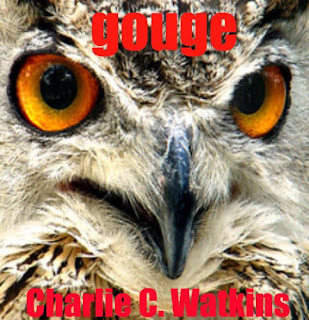 Here's mine. Can you believe I got an owl? Spooky!
Here's mine. Can you believe I got an owl? Spooky!And yeah, I know there isn't a person in the picture, but the people ones were a bit disturbing... and I mean c'mon I wasn't going to let that owl go!
Via: Alien Onion.
Here's the instructions:
1 - Go to "Fake Name Generator" or click http://www.fakenamegenerator.com/
The name that appears is your author name.
2 - Go to "Random Word Generator" or click http://www.websitestyle.com/parser/randomword.shtml
The word listed under "Random Verb" is your title.
3 - Go to "FlickrCC" or click http://flickrcc.bluemountains.net/index.php
Type your title into the search box. The first photo that contains a person is your cover.
4 - Use Photoshop, Picnik, or similar to put it all together. Be sure to crop and/or zoom in.
5 - Post it to your site along with this text.
Have a look at the gallery.










